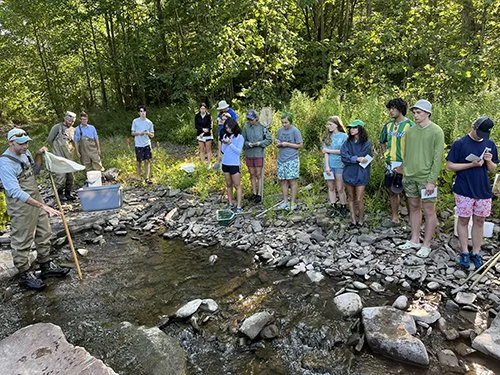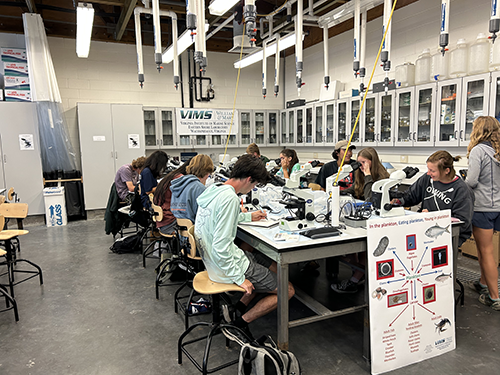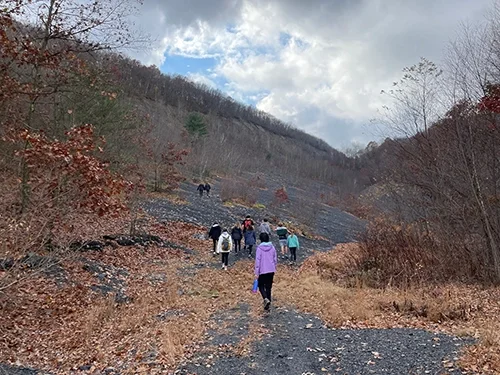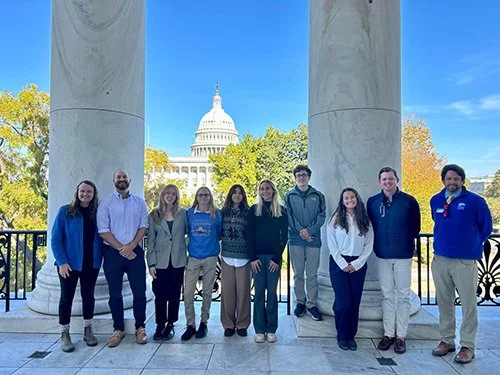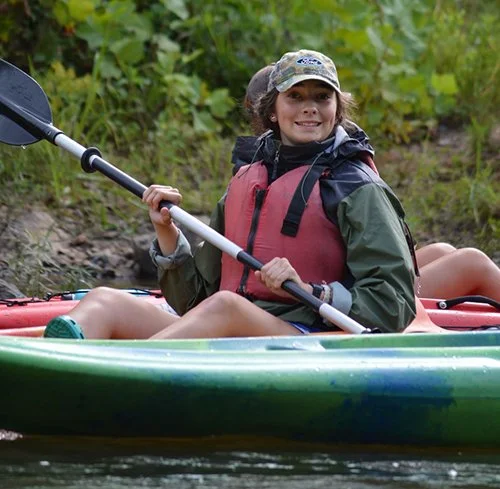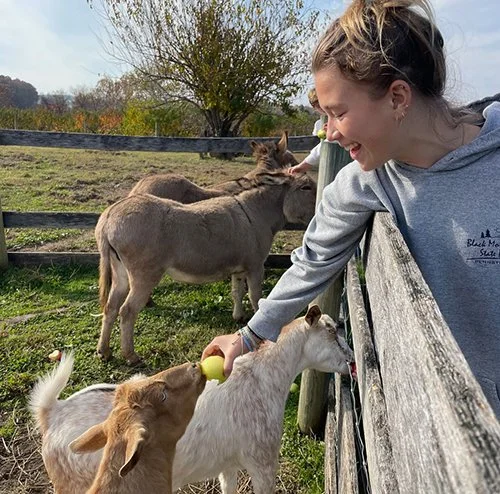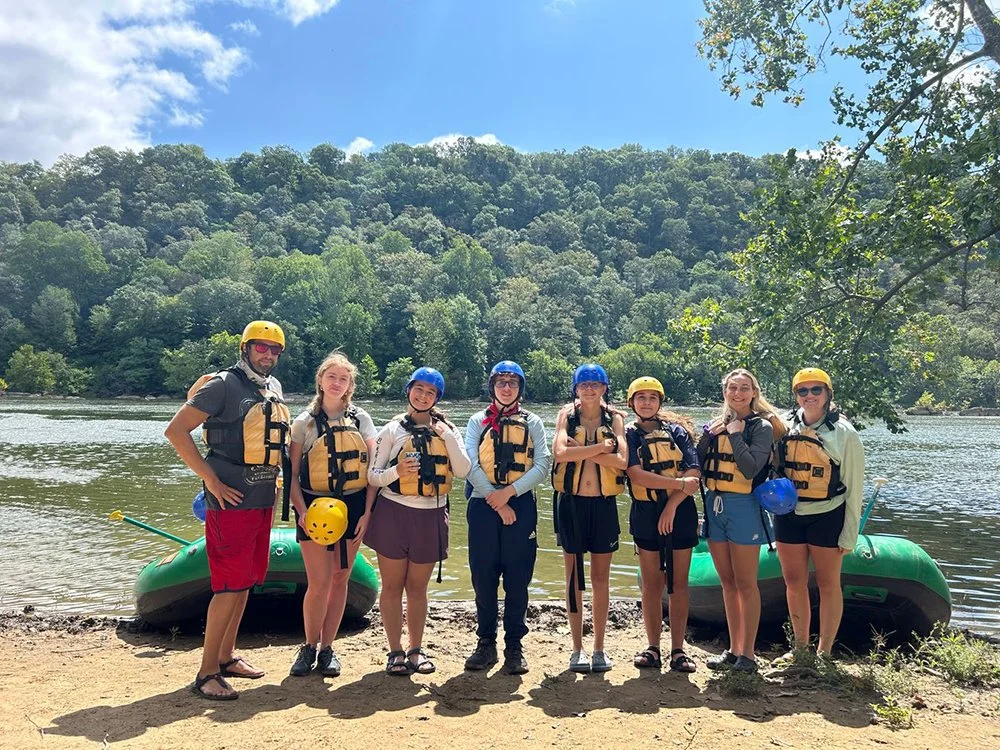
Expeditions
A 64,000 square mile classroom
Week-long field studies offer students opportunities to engage fully with an ecosystem, history, and culture of a community. During the course of the semester, students typically participate in a Kayaking Expedition on the Captain John Smith Trail, spend time researching Restoration Ecology & Climate Science with Tangier Island and Smith Islands, explore the intersection of The Environment, Government, and Public Policy in Washington, DC & Annapolis, MD, and investigate Land Use and Energy in the Headwaters in Harrisburg and Lancaster, PA.
Extended Overnight Expeditions
Orientation Expedition
Each semester kicks off with the Orientation Expedition to bring the group together and establish a connection to the watershed. Each semester’s trip is unique; prior semesters have kayaked on the lower Eastern Shore, hiked and camped in the Shenandoah Mountains of Virginia, or stood on Council Rock in the headwaters of the Susquehanna River in Cooperstown, New York. Through experiential learning, classes in the field, sharing meals and relaxing around the campfire, each cohort of students and faculty “gel” in this first adventure together. To build connection and inclusion, we intentionally disconnect from phones during this trip.
Chesapeake Bay Science Expedition
In partnership with the Virginia Institute of Marine Science and the College of William and Mary, the science expedition bases from the Eastern Shore lab in Wachapreague, VA. Each day is a blend of field sampling and data collection, with time in their state-of-the-art wet laboratories to investigate and analyze our findings. A trip to the mudflats always means a meal of fresh clams back at the dorm one evening. Weaving history and culture into the expedition, students visit the Barrier Island Center and have several literature classes in the field during this trip.
Bay Culture and Livelihoods Expedition
We journey to Maryland’s Southern Eastern Shore to explore how people have lived and made a living on or near the Chesapeake Bay for centuries. On the trip, students start with an exploration of the mainland town of Crisfield and interview local officials about the strengths and difficulties of making a living on the Bay. They then kayak through a salt water marsh to explore a beach where there was once a thriving community, but has disappeared over the course of the last 2 generations. The heart of the trip though is boat ride out to Tangier Island in the Chesapeake where the students explore how the culture of these unique islands are coping with the changes on the Bay.
Land Use and Energy Expedition
We travel to Central Pennsylvania to reach the coal mining and fracking portions of the watershed. Blending literature and public policy, students explore these landscapes, meet with conservation and preservation specialists, farmers, and community members to understand the competing challenges of urban sprawl, mining, and shifting agricultural practices in restoring the health of the Chesapeake Bay. This trip inspires students to think about the Chesapeake Bay in new and unique ways..
The Chesapeake Watershed Semester has so many Day Expeditions that it would fill its own website, but we wanted to write about some sample day trips so you can have a feel for the nature and variety of these trips. If you would like more examples of our day trips, please do not hesitate to reach out to bhirsh@gunston.org.
Climate Studies and Resiliency
Wrapping up each Semester with a focus on understanding climate studies and the impacts of climate change in urban areas, we travel to Norfolk, the lowest lying city in the United States other than New Orleans. The students spend their time exploring how different actors in the Norfolk community are grappling with their rapidly changing relationship to the water. Students examine what makes the southernmost part of the Bay unique both scientifically and culturally. Throughout the trip, students contemplate and confront how different communities have different resources to combat rising tides due to long standing societal ills such as racism and poverty. They learn about how both the Navy and a traditionally under-resourced community have started to combat rising tides.This is a truly thought provoking trip that brings many of the threads of the entire semester together.
Single Day Expeditions
Washington DC Day Expedition: The Intersection of Politics & Agriculture
One of the major threads in the Chesapeake Watershed Semester is that there are many different levels of decision makers that impact the Chesapeake Bay. On this field trip, we explore the federal level of decision makers. After exploring the role of Congress in environmental policy, CWS visits Congress. We meet with two Gunston alums who serve as lawyers for the House of Representatives Agriculture Committee and explore how elected officials make decisions that impact the watershed and all of the people that live here. The students end the day with a tour of Congress to learn more about the history of the building and the Legislative Branch of our government.
Chester River Expeditions: Kayaking Down a Tidal Chesapeake Tributary
The Chesapeake Watershed Semester owns two vans and a mobile kayak trailer with 16 kayaks that we use to explore the tributaries of the Chesapeake Bay. A major tributary near CWS is the Chester River, and we use our kayaks to extensively explore the science, geography, and history of the river. On one trip, we start in the upper reaches of the Chester River near its headwaters in Millington, MD; we spend another day exploring the middle part of the Chester near Chestertown, MD; and we complete our river study by kayaking near the mouth of the Chester where it meets the Chesapeake Bay in Queenstown, MD.
Baltimore & Annapolis Day Expeditions: Composting and Cleaning In Urban Environments
While a good portion of the Semester is spent in rural areas and exploring rural issues and impacts on the Chesapeake Bay, CWS also devotes a good portion of its time considering and learning about urban and suburban impacts as well. One of the students favorite day trips is to Baltimore to meet the head of the Baltimore Compost Collective and listen to him explain his mission to get more of Baltimore to embrace composting as an avenue to reduce pollution in the city and connect Baltimoreans to the land that produces their food. We end the day with a hike that leads us to Mr. Trashwheel, which is a boat that sweeps the Baltimore Harbor for trash and discuss how different areas raise awareness for pollution clean up efforts. CWS also travels to Annapolis to interview the mayor of Annapolis about the strategies that Annapolis is enacting to reduce its impact on the Bay, specifically focusing on the renovation and revisioning of the downtown maritime area.
Farming & Food Explorations:
Throughout the Chesapeake Watershed Semester, the students will visit various farms for one day, such as St. Brigid’s Farm or Lockbriar Farm. As they explore these farms and talk to the farmers, the students learn about the starting point for food production and also how the farmers interact with the government regulations that impact their lives and the Chesapeake Bay.

